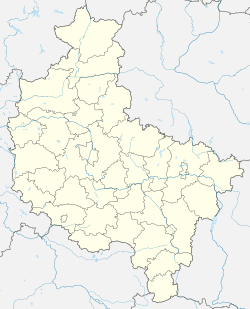Oborniki
Oborniki [ɔbɔrˈɲikʲi] (German: Obornik) is a town in Poland, in Greater Poland Voivodeship, about 30 km north of Poznań. It is the capital of Oborniki County and of Gmina Oborniki. Its population is 18,176 (2005).
Oborniki | |
|---|---|
.jpg) Market Square (Rynek) in Oborniki | |
 Flag  Coat of arms | |
 Oborniki  Oborniki | |
| Coordinates: 52°39′N 16°49′E | |
| Country | |
| Voivodeship | |
| County | Oborniki County |
| Gmina | Gmina Oborniki |
| Town rights | 13th century |
| Area | |
| • Total | 14.08 km2 (5.44 sq mi) |
| Population (2006) | |
| • Total | 17,850 |
| • Density | 1,300/km2 (3,300/sq mi) |
| Time zone | UTC+1 (CET) |
| • Summer (DST) | UTC+2 (CEST) |
| Postal code | 64-600 |
| Area code(s) | +48 61 |
| License plates | POB |
| Website | oborniki.pl |
History

Oborniki was granted town rights before 1292.[1] Duke Bolesław the Pious founded a Franciscan monastery in Oborniki in the 13th century.[2] It was a royal town of the Crown of the Kingdom of Poland. It was frequently visited by King Władysław II Jagiełło.[2] As a result of the Second Partition of Poland in 1793, it was annexed by Prussia. In 1807 it became part of the short-lived Polish Duchy of Warsaw. In 1815 it was annexed by Prussia for the second time. The townspeople fought in the struggles for liberation of Poland, including the November Uprising, Greater Poland uprising (1848), January Uprising and the victorious post-World War I Greater Poland Uprising, as a result of which the town was integrated with the reestablished Polish state in 1919.
Sights
Among the historic landmarks of Oborniki are:[2]
- the Market Square filled with historic townhouses
- the Church of the Assumption, dating back to the 15th century
- the timber-framed Holy Cross church
- the Gothic Revival Saint Joseph Church
International relations
Oborniki is twinned with:
Gallery
 Holy Cross Church
Holy Cross Church Church of the Assumption
Church of the Assumption Saint Joseph church
Saint Joseph church- Hydroelectric power plant

References
- Robert Krzysztofik, Lokacje miejskie na obszarze Polski. Dokumentacja geograficzno-historyczna, Katowice 2007, p. 56-57
- "Śladami historii". UM Oborniki (in Polish). Retrieved August 10, 2019.
- "Herk-de-stad". UM Oborniki (in Polish). Retrieved August 10, 2019.
- "Kobuleti". UM Oborniki (in Polish). Retrieved August 10, 2019.
- "Lüchow". UM Oborniki (in Polish). Retrieved August 11, 2019.
External links
- Official town website (in Polish)
